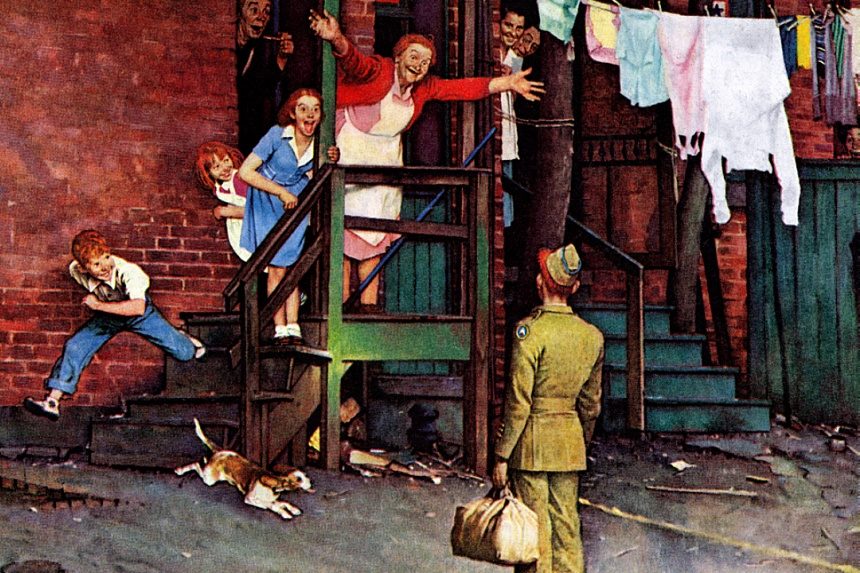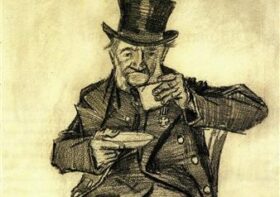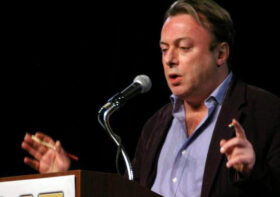Better There Had Been No Story at All

Homecoming G.I. (1945) by Norman Rockwell
War is an ugly thing
A brutal thing
But, by God,
A needful thing.
It will take a man
A boy
Strip him to the skin
Throw him naked
Trembling and flaccid
To the very brink
To that place where the earth,
That closest of friends,
Claws at him viciously
With blood soaked talons
Of gravel and bone and metal,
Filling his nostrils
With the decay of his own pale flesh.
It will turn the vast expanse
Of humanity,
The cradle of love and hope,
Into the twin ideas
Of friend and foe
Only to kill his few friends
In his very arms
And bend his soul
Into the shape of a crude weapon
With which he gores
and bludgeons the foe,
Realizing far too late that the foe
Was only himself
dressed in different colors.
This excoriation of mind and heart
It forces down his throat
As a tonic
A ghastly elixir
That numbs the pain
And quells the spasms of conscience
Which rack his every waking moment,
Yet the medicine is utterly unable
To dam these things from
Spilling over into his dreams
Where demons wait for him,
Their manacles and whips at the ready.
War rips him from home
From life itself,
Blotting out all that fills his past
And recreating his world anew,
Rebuilding the landscape of his existence
Out of smoke and fire and great clots of torn dirt.
In this confusion he wanders
With a curious ache in his stomach
For something touched by his mother’s ladle
And is fed instead cigarettes
Half stale bread
A slap on the back.
He knows not if the war is just
And hardly does he care
For there it is all the same.
He fights not for God
Or for the Good
Or for his country
Or even for his family.
He fights for the poor devil beside him.
Even this he doubts.
For in that critical space of several heartbeats
Where all that is heard is the whine
Of an incoming shell,
He knows in his bones that
The impossible force which puts one boot
In front of the other
Is nothing save the sheer reflex
The animal impulse
Toward self-preservation.
He feels he is more rodent than man,
And yet what rodent was ever
So repulsed by itself?
No war is forever.
He understands this despite himself
And despite the fact
That the war was indeed forever for
Barry
James
Harold
Douglas.
Miraculously, absurdly, he survives.
He watches the flag wave
In the stupidly warm and soft breeze
Of his hometown.
Alone he spends his days,
Avoiding even his closest companions
For fear—
No, for the certainty—
That they will either talk of the war
Or worse, silently remind him of it.
He is to the them a walking souvenir
From that wasteland,
A trinket to be trotted out
At parties and in barrooms.
He takes no bride.
He lusts after married life,
But the terror of issuing a son,
a toy soldier,
Is too much to bear,
And he could never corrode
Something so beautiful as a woman
By shackling her to his sterility.
But that is all beside the point
For he knows not how to speak with a woman.
At the station of life
In which a boy learns how to
Flatter
Tease
Kiss
He learned how to dig a trench
And a grave
And shrapnel from a groin.
What he really craves is not a wife
But a comrade.
It is too bad.
They are all rotting a thousand miles away.
He is fortunate, however.
In the dust, the world begins
To tell a story.
Oh how they love to tell a story,
These people in their leather chairs
With their cats and books and orange juice.
They decide his country was on the right side.
The good guys have won.
Freedom reigns.
He is a hero.
He cares not.
Better there had been no story at all.
Better there had been no story at all.




Leave a Reply